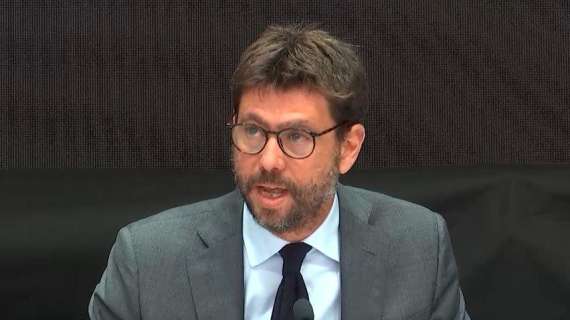The Super League 2.0 to be re- launched today? The document to the EU leaks
 TRANSFERmarketWEB.com
Last year, European Super League chiefs saw their earth-shattering proposal collapse in disastrous fashion. Ringleaders Barcelona, Real Madrid and Juventus were left stranded when their English counterparts withdrew after initially pledging support. Now, with hopes of reviving the doomed project reportedly alive, they have devised a new plan:
According to Gazzetta dello Sport, the newly drawn up European Super League would not consist of a closed format. Promotions and relegations would instead be possible in two separate divisions.
Barca, Real and Juve reignited plans to launch a new Super League last summer, only to find that their American-style 'closed' tournament was the biggest problem from a legal standpoint. They are therefore prepared to compromise and introduce two Super Leagues consisting of 20 teams each.
It is not yet clear whether Andrea Agnelli - whose speech at the Business of Football Summit organized by the Financial Times is scheduled for 5.30 pm - will actually announce the new project today, further details emerge from Spain on the structure that the future Super League should go to.
The document to the EU
In recent weeks, Agnelli and Perez reportedly sent a document entitled "rethinking the future of football in the EU" to the institutions of the European Union. In the final pages of the chapter dedicated to the Superlega project - subject to the approval of FIFA and UEFA or alternatively to the legal support of the European Union - you can read the ten reasons why, according to its supporters, the proposal was born and above all it should protect the future of football.
In particular:
1. It is not an escape proposal;
2. the concept of permanent members will be eliminated, with an opening to all European clubs;
3. it is an acknowledgment that the system no longer works;
4. UEFA's role creates structural conflicts;
5. Increasing ties of some club owners with non-member states;
6. high quality matches are missing;
7. financial controls are inadequate;
8. there is a lack of transparency and accountability in the solidarity mechanisms;
9. the European Union is gradually losing control over football;
10. Clubs from large cities located in smaller Member States cannot compete in the current UEFA model.
Other news - Transfers
Other news
- 31.12.2025 17:44 - Galatasaray face Icardi contract dilemma: wages the sticking point, AS Roma sound him out
- 31.12.2025 17:30 - AC Milan turn to Morato to bolster defence: the ‘physical’ profile Allegri is seeking
- 31.12.2025 17:03 - Kvara not properly replaced, Elmas handed the nod,keep an eye on Noa Lang in January
- 31.12.2025 16:48 - Barcelona step up pursuit of Egyptian prodigy Abdelkarim, improve offer to Al Ahly
- 31.12.2025 16:44 - Juventus burn through almost €1bn since CR7: €900m lost in six years
- 31.12.2025 14:39 - Modrić: “I thought I’d finish at Real Madrid, but AC Milan have always been there"
- 31.12.2025 10:03 - KO 4-1 and taunted by Arsenal fans: Martínez escorted down the tunnel
- 31.12.2025 09:59 - Not just Hugo: AC Milan tracking another Souza: Kauã Prates also on the radar in Brazil
- 31.12.2025 09:57 - Crazy idea of a Cancelo return to FC Inter: loan deal possible if Al Hilal share the wages
- 30.12.2025 17:53 - Hungary’s latest prodigy catches the eye, Inter among clubs monitoring 2010-born striker
- 30.12.2025 17:51 - Thiago Silva to AC Milan? Cassano reveals: “There was an agreement, but Allegri blocked it”
- 30.12.2025 17:49 - SSC Napoli, from England: Manchester United dream of shock McTominay return
- 30.12.2025 17:46 - A strategy that pays off: Real Madrid reap huge capital gains through buy-back clauses
- 30.12.2025 17:42 - AC Milan request meeting with Maignan and his agent: full details of the renewal offer
- 30.12.2025 17:40 - Manchester City close in on Semenyo as player’s entourage meet the club
- 30.12.2025 17:38 - Al-Khelaïfi hails historic 2025 for PSG: “A simply exceptional year”
- 30.12.2025 17:37 - Aké too expensive as Barcelona hold back: City only willing to sell permanently
- 30.12.2025 17:35 - Ter Stegen to Girona hinges on two factors: Germany set World Cup ultimatum
- 30.12.2025 17:33 - Tottenham give green light for Brennan Johnson to join Palace: player to decide within 48 hours
- 30.12.2025 17:32 - Athletic Bilbao, Iñaki Williams pulls no punches: “Playing in Saudi Arabia is shit”
- 30.12.2025 17:30 - Guille González leaves Cádiz for Real Madrid: Andalusian club confirm move
- 30.12.2025 17:27 - Atlético Madrid, mutual satisfaction with Raspadori: January exit looks unlikely
- 30.12.2025 17:24 - AC Milan step up striker hunt: talks accelerated with Angers for Chérif
- 30.12.2025 17:23 - Lazio, Castellanos closer than ever to exit: Sarri wants a Mertens-style striker: the names
- 30.12.2025 17:20 - Juventus: Inter open to paid loan for Davide Frattesi as Spalletti waits
- 31.10.2025 17:29 - Petar Sucic, the prediction from the coach who launched him: “After Inter, he’ll join Real Madrid”
- 23.09.2025 15:36 - AS ROMA - Alberto De Rossi exclusive: youth development, Gasperini, agents and why facilities make the difference
- 23.09.2025 15:20 - Braida exclusive: “Galliani is a champion. Allegri has brought discipline, AC Milan will be a threat”
- 23.09.2025 15:18 - Post-Messi and Ronaldo dominance yet to arrive - Dembélé’s Ballon d’Or is proof
- 23.09.2025 15:16 - At 37, Sergio Busquets set to hang up his boots
- 23.09.2025 15:13 - Costly coup turns sour: Giménez under pressure at AC Milan
- 23.09.2025 15:12 - Vinícius contract talks stall as Real Madrid dig in on renewal terms
- 23.09.2025 15:03 - Ballon d’Or for Dembélé - exclusive: ex-coach Philippe Montanier recalls his rise
- 10.09.2025 11:47 - Skriniar: “Me at Ac Milan? Never say never, but I’m getting older. No contact this summer”
- 10.09.2025 11:16 - Simić succumbs to Saudi riches: ex-Milan defender joins Al Ittihad in €20m deal
- 10.09.2025 11:14 - SS Lazio, transfer rumours heat up ahead of January: how can the market be unlocked?
- 10.09.2025 11:10 - Bayern Munich’s big regret: Yamal deal collapsed in 2022
- 29.08.2025 15:33 - Bayern challenge As Roma and Juventus in market moves for George and Nicolas Jackson
- 29.08.2025 15:29 - Newcastle, Howe signals openness to Isak sale: “I can’t ignore what has happened”
- 29.08.2025 15:28 - Inter, Newcastle renew interest in Frattesi: opening offer rejected
- 29.08.2025 15:26 - AC Milan, Trabzonspor move for Bennacer: offer made as midfielder takes time to decide
- 29.08.2025 15:24 - From France: No Juventus move for Zhegrova as Marseille strike deal with De Zerbi
- 29.08.2025 15:22 - Marseille target West Ham’s Nayef Aguerd as De Zerbi pushes for defensive reinforcements
- 29.08.2025 15:20 - Como bid €28m for Jimenez but AC Milan hold out for more: Bournemouth also in the frame
- 29.08.2025 15:17 - Shock at Manchester United: Bruno Fernandes open to Al Ittihad move
- 29.08.2025 15:16 - AS Roma, Gasperini on Sancho: “We don’t beg anyone. If he’s not convinced, he’ll stay where he is”
- 29.08.2025 15:14 - Juventus make move for Ceballos as intermediaries head to Turin
- 29.08.2025 14:39 - Mourinho sacked but leaves richer: Marca reports €15m pay-off
- 05.07.2025 00:30 - Official: world’s priciest 2008-born footballer heads to Italy - Ahanor sets his sights on Atalanta
- 04.07.2025 16:33 - Skriniar edging closer to Fenerbahçe, fee agreed with PSG, but a pay-off still to iron out
- 04.07.2025 16:27 - Genoa’s prized asset De Winter draws Inter’s gaze, three Premier League clubs also in the hun
- 04.07.2025 16:23 - Adeyemi pledges his heart to Dortmund: "This is home - I was a BVB fan as a kid"
- 04.07.2025 16:17 - Real Madrid revolution: from football to basketball, every major coach shown the door
- 04.07.2025 16:12 - Comolli’s Juventus hit-list: targeted moves, the Frenchman’s blueprint, and why David (and maybe Sancho) tick the right boxes
- 04.07.2025 16:08 - TMW - Atalanta fend off Chelsea, Milan and Roma to land Ahanor - teenager already in Bergamo
- 04.07.2025 16:06 - TMW - SSC Napoli back on the trail of Kean as the Azzurri rival Al-Qadsiah and United
- 18.04.2025 12:36 - Messi Reveals: “I Wanted to Return to Barcelona, My Home - But It Wasn’t Possible”
- 18.04.2025 12:28 - Man United, Amorim Inspired by ’99 Heroes: “Criticism Is Fair, but This Is a Special Moment”
- 18.04.2025 12:28 - Lyon Heartbreak at Old Trafford, But Tolisso Reflects: “One of the Most Beautiful Moments of My Career”
- 18.04.2025 12:21 - Napoli Trigger Anguissa Contract Extension - But Saudi Temptation Looms
|
AL-KHELAÏFI HAILS HISTORIC 2025 FOR PSG: “A SIMPLY EXCEPTIONAL YEAR”
 Paris Saint-Germain are set to bring the curtain down on a 2025 that has gone straight into the club’s history books. It has been a truly unique year, crowned by international recognition and, above all, six trophies that have firmly established the Parisian side among...
BAYERN MUNICH’S BIG REGRET: YAMAL DEAL COLLAPSED IN 2022
 Transfer sagas often hide remarkable stories, none more so than the revelation from Bild that Bayern Munich came close to signing Lamine Yamal back in 2022. The teenager, now regarded as Barcelona’s crown jewel and a future star of Spanish football, was on the brink of...
|
|













 here were plenty of notable takeaways from the interview given today to Corriere dello Sport by SSC Napoli sporting director Giovanni Manna. The Naples-based executive shifted the focus of the January transfer window firmly onto the attack, chiefly due to concerns over the...
here were plenty of notable takeaways from the interview given today to Corriere dello Sport by SSC Napoli sporting director Giovanni Manna. The Naples-based executive shifted the focus of the January transfer window firmly onto the attack, chiefly due to concerns over the...
 FC Barcelona are stepping up their push for Hamza Abdelkarim. The Catalan club are pressing to seal a deal that would bring the 2008-born forward from Al Ahly SC to Barcelona, initially linking up with Barça Atlètic, after improving the terms of their proposal...
FC Barcelona are stepping up their push for Hamza Abdelkarim. The Catalan club are pressing to seal a deal that would bring the 2008-born forward from Al Ahly SC to Barcelona, initially linking up with Barça Atlètic, after improving the terms of their proposal...
 Emiliano “Dibu” Martínez did not hold back after Aston Villa’s heavy 4–1 defeat away to Arsenal. The 33-year-old Argentina goalkeeper lost his cool in the Emirates Stadium tunnel as he headed back to the dressing rooms, having picked the ball...
Emiliano “Dibu” Martínez did not hold back after Aston Villa’s heavy 4–1 defeat away to Arsenal. The 33-year-old Argentina goalkeeper lost his cool in the Emirates Stadium tunnel as he headed back to the dressing rooms, having picked the ball...
 Paris Saint-Germain are set to bring the curtain down on a 2025 that has gone straight into the club’s history books. It has been a truly unique year, crowned by international recognition and, above all, six trophies that have firmly established the Parisian side among...
Paris Saint-Germain are set to bring the curtain down on a 2025 that has gone straight into the club’s history books. It has been a truly unique year, crowned by international recognition and, above all, six trophies that have firmly established the Parisian side among...
 Transfer sagas often hide remarkable stories, none more so than the revelation from Bild that Bayern Munich came close to signing Lamine Yamal back in 2022. The teenager, now regarded as Barcelona’s crown jewel and a future star of Spanish football, was on the brink of...
Transfer sagas often hide remarkable stories, none more so than the revelation from Bild that Bayern Munich came close to signing Lamine Yamal back in 2022. The teenager, now regarded as Barcelona’s crown jewel and a future star of Spanish football, was on the brink of...
